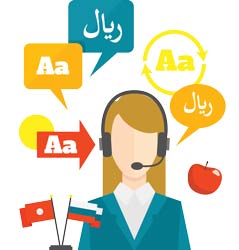
Focus on Accessibility: Expanding the Court’s Interpreter Program
Data from the 2010 census indicates that about one third of Contra Costa’s population over the age of 5 speaks a language other than English at home. This translates to a large percentage of court users who need assistance in another language. Fortunately, the Judicial Council’s Language Access Plan Implementation Task Force has been hard at work putting into practice the recommendations of the Strategic Plan for Language Access in the California Courts that will provide interpreters in all Court services within the next five years.
The plan contains eight primary goals along with 75 recommendations to be carried out and implemented in three phases over a five-year period (2015-2020). The main goal of the plan is to provide a comprehensive set of recommendations that create a branchwide approach to providing language services both in the courtroom and outside of the courtroom, while accommodating the very diverse needs of the courts and their communities, which are spread out over 58 counties.
The Strategic Plan for Language Access in the California Courts calls for providing a qualified interpreter in any court proceeding without cost to the limited English proficiency (LEP) court user. That would include all civil matters such as family law, unlawful detainers, limited and unlimited civil, probate, guardianship, and place LEP court users on equal footing as is currently mandated in all criminal proceedings. In addition, appropriate language access services would also be required in court-mandated or court-operated proceedings, such as family mediation.
The plan also seeks to improve language access by utilizing technology to expand language access services, including video remote interpreting in cases that would be appropriate when an in-person interpreter may not be available. The plan also recommends that courts work with education stakeholders in efforts to expand the number of certified interpreters by providing insight as to the needs of the courts, the qualifying factors to become a certified interpreter, and collaborating with education stakeholders to provide the appropriate educational tools and mentorship programs to assist those interested bilingual individuals to prepare for and pass the interpreter exam and launch a career as a court interpreter.
The plan recognizes that meaningful access needs to commence even prior to the appearance in a courtroom, through multi-language translated forms and notices, as well as bilingual staff or other language access services that assist LEP court users at the clerk’s office and at other meaningful points of contact within a courthouse.
The plan also calls for education and training to be provided to judicial officers and court staff on understanding the issues faced by LEP court users, the challenging nature of serving as a court interpreter, and becoming aware of the plan’s goals and objectives.
The plan recognizes that our courts will need to collaborate with our interested stakeholders in identifying the needs of LEP court users and calls for early identification of language access needs, coordinating of services to expedite meeting the needs of LEP users, and reducing delays, frustration and the inconvenience caused when an interpreter is not available. The plan also recommends collaborating with community-based organizations and ethnic media outlets to inform the LEP community of the availability of these services that were not being offered previously by the courts.
Here in Contra Costa, we have routinely provided interpreters in criminal, juvenile, traffic, elder abuse and domestic violence cases for several years. We began expansion of interpreter services in November of 2014 by providing interpreters in civil harassment, unlawful detainer, conservatorships, guardianships and proceedings to terminate parental rights. A few months later, the Court further expanded services by providing interpreters in all family law cases. By the last six months of 2015, of the total 9,214 interpretations provided, 478 were in new case types.
The Court is also reaching out to LEP customers in other ways. Since 2015, telephone interpretation services have been available at all filing counters and in the Family Law Facilitator’s Offices. The vast majority of persons needing interpreters in our county are Spanish speakers. In order to better address their needs, the filing window television screens in each Court location have been translated into Spanish. Plans are underway to have the ticket dispenser screens in civil and at the branch courts offer English and Spanish options. The Family Court Services Orientation online is available in English and Spanish, and most of the Court’s website has been (or shortly will be) translated into Spanish.
We may have a ways to go before we can guarantee equal access to every court user, but we are very proud of the progress we have made regarding expanding language access services.